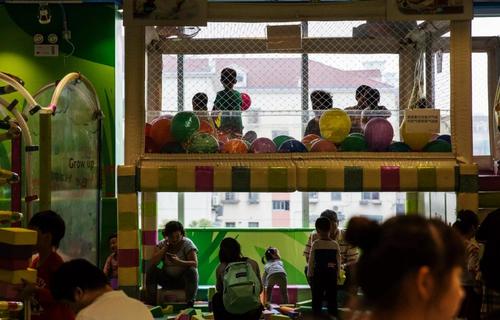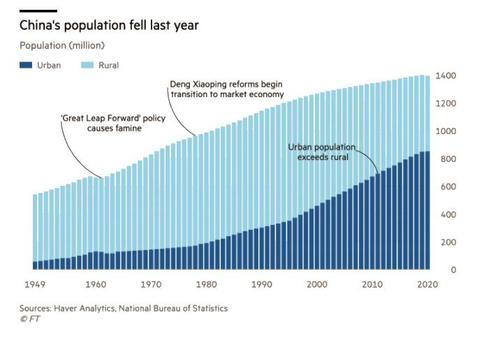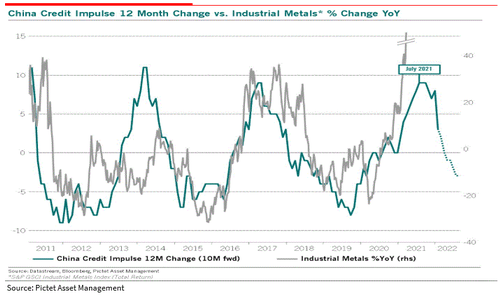China Allows Families To Have Up To 3 Children Amid Dramatic Drop In Birth Rates
As concerns about China's looming population decline intensify (stoked by news that the country's birthrate fell to its lowest level in 2020 since CCP record-keeping began in 1949), Chinese news agency Xinhua reported Monday morning that the Politburo has decided to allow couples to have up to three children.
It's not clear when the policy will take effect, but the meeting focused on policy changes that could be implemented in the period between now and 2025, and also included other important changes, like a commitment to "prudently lift the retirement age in a phased manner," according to Xinhua.
The decision to lift the maximum number of births is the biggest shakeup to the CCP's notoriously strict family planning policies since the Party abolished China's one-child policy back in 2015. But it's not exactly a surprise: Internal dissatisfaction with the population growth rate had led to top party officials openly discussing the shortcomings of the two-child policy with western media, a sign that a major rethink was likely on its way, as we pointed out back in January.
Source: FT
Now, that rethink has arrived just as China's all-important credit impulse has turned negative and concerns about GDP growth, which had already begun to slow even before the pandemic (remember 2019 saw the slowest growth in a decade), are prompting the Politburo to shake things up.
Additionally, it's worth noting that the decision to allow couples to have up to three children comes just weeks after Beijing published the results of China's latest census, which set off additional alarm bells that China's working-age population was shrinking relative to the size of its retired population. The census showed that China reported only 12MM births last year, the lowest annual reading since 1961, and down 18% from 2019.
Here's more on the decision, which was made Monday during a Politburo meeting presided over by President Xi Jingping, from Bloomberg News. The decision was made to help improve the "population's structure," according to a statement from Xinhua.
China will allow all couples to have a third child, a surprise move aimed at slowing the nation’s declining birthrate as risks to the economy’s long-term prospects mount because of a rapidly aging population.
In a meeting presided over by President Xi Jinping Monday, the Communist Party’s Politburo decided to ease the current two-child restriction, saying “allowing every couple to have three children and implementing related support policies will help improve the population’s structure,” according to a report by the official Xinhua News Agency. It wasn’t clear when the move would take effect, although the meeting discussed major policy measures to be implemented in the period to 2025.
China has been gradually reforming its stringent birth policy that for decades limited most families to only having a single child, with a second child allowed since 2016. However, that reform did little to reverse the declining birthrate and further relaxation of the limits is unlikely to lead to a sustained increase.
At 1.41 billion, China's population is the biggest in the world, but increasingly economists worry that the "pandemic effect" will cause it to start shrinking before 2025 (it was previously thought that the decline would begin around 2030).
“The Politburo probably saw the latest census results and with all the public consensus about a change, it’s easier now to make a decision,” said Henry Wang, president of the Center for China and Globalization, a think-tank linked to China’s government. “They probably need some time before they completely drop” the birth restrictions, he said. “If this adjustment doesn’t help, then that would help them make a future decision,” he added.
Bloomberg's Eric Zhu, a China-focused economist, said the new policy is "a step in the right direction but it’s not enough to head off an inevitable demographic drag on the economy. Other steps, including birth- and parenting-friendly policies and an increase in the pension age, are needed as quickly as possible if China stands a chance of slowing a looming decline in its workforce and crunch from an aging population."
Demographers expect that even with a looser birth policy, China's population will likely continue to shift as Chinese citizens embrace the trend toward smaller family sizes that has taken hold in North America and Europe. "For those people who are rich, relaxing the policy will encourage them to have more children but for the common citizens, like the middle class or even the lower class, they don’t have enough incentive to make use of this new policy," said Vivian Zhan, an associate professor of Chinese politics at the Chinese University of Hong Kong.
Shares of companies producing baby formula and other childcare and fertility-related products and services jumped on the news. Milk formula maker Beingmate Co. Ltd. rose as much as 10% in Shenzhen, while fertility clinic service provider Jinxin Fertility Group Ltd. surged almost 24% in Hong Kong. Shares of French food maker Danone climbed as much as 1.6% in Europe.
Over the long term, China's aging population will contribute to rising prices while growth sputters, unless the state commits to expanding pensions and committing more resources to caring for the elderly, while continuing to ensure growth in China's industrial and high-tech sectors as well. Last time around, when China lifted the one-child policy in 2013, the country's population growth accelerated mildly during the following years, but that bump quickly faded as the pressures of modern life increasingly make small families more practical.
https://ift.tt/3c5b7DL
from ZeroHedge News https://ift.tt/3c5b7DL
via IFTTT




0 comments
Post a Comment